| The
Purpose of HEALING - K.I.S.S.
- as stated 12 years ago - was and is
to help me and my potential P E E R s
"to HEAL ourselves into WHOLEness,
and - by extension - all of CREATion!" |
|
I focus my experiencing and awareness on being
"a pioneer of Evolution
in learning to feel":
I let my Body vibrate and my Heart 'womb'
pain, shame, fear, boredom, powerlessness,
so feelings can >heal >guide>fulfill>evolve,
and ~~~ offer ~~~"goldmines"~~~ to us all!!
"I
want you to feel everything, every little thing!"
|
|
K.I.S.S. -
L O G 2
0 0 8
Keep It Simple Sweetheart
whole&full-filled, never perfect&complete


intro
to k.i.s.s.-log ~ library
of seven years ~ HOME
~ contact
February
5,
Tuesday - between Arad
and Shoham
back to past ~~~~~
forward to future
image of the day
| |
Coming back from the morning-pool
I am finding this "skype" announcement.
On the average I get one quest like this
from Arab countries per day,
but this time I sat there for a while pondering,
if I should answer.
Hassan wrote the cryptic words~~~~~~~:
"I'm writing a letter in
order to get to know you.
I won't forgive you as long as I live
Is this your experience with life?"
I decided to follow
my present principle
of not getting involved
in any interaction
,
which does not promise daily continuity
of the "Healing-Learning PEERSHIP" I yearn
for.
Also, wants
to communicate in Arabic,
while I've given up investing superhuman efforts to
conquer:
|
|
|
hodayot [thanksgivings] for
today
8:40
My Body,
my Partner,
I give thanks to our neck, its blood-vessels, nerves and joints,
remembering one excruciating attack of "stiffness"
in 1986,
when - following a talk-show with me on TV- a man wrote and
invited me,
to park my
bus in his orchard and live there for a while unharassed
by authorities,
but who himself harassed me and when I did not succumb ,
evicted me despite my physical immobility.

I give thanks to all the "bugs"
which I attract into my daily drama,
and I ask our neck to no longer be 
[see
an article about the "hard neck" of "God's
people" in the Bible with the title]

but - when irritated by a "bug"
- to immediately turn around
and discern the blessing in the curse, the fruitful in the
frightful!
|
I'll not communicate with MY PEER today.
Though I've only recently promised
myself
to savor such communication daily from now on,
and did so with the elation of a heart in love,
I now feel estranged and cold and closed.
So I'll have to do my "Finetuning
to My Present" alone:
"Finetuning
to My Present" in the morning - 11:00 at Arad!!!!
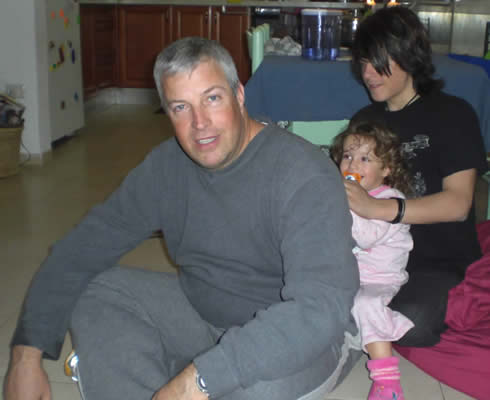 The second "bug" yesterday,
late at night, was this:
The second "bug" yesterday,
late at night, was this:
I had successfully recorded my "color-song"
with the software "SoundForge",
and now only needed to attach it to one of my two present
"Sound-buttons",
a green chacra, and a spiral,
After Immanuel had taught me the process of doing this
with the software "Flash",
the ten steps or so took not more than a minute.
But now, after Immanuel had installed my old, but familiar
version of "Flash"
on the new computer,
I couldn't find the "Sound-Panel", try as I
might.
It was already 22:40
and I wanted to watch the 9th episode of the
series "Arab Work".
This time I was eagerly awaiting the break for commercials
and when it came, I hurried to skype Immanuel, ashamed
to disturb him so late,
especially since he had to go on flight the next early
morning.
He answered: "Aren't
you watching 'Arab Work'?"
Last week, at Shoham, I recommended
this program, poor as it is.
During this and the second break he discovered what the
bug was,
and I could close the day with a very
satisfying sound-images sculpture.
But what was the "purpose" of having been forced
to disturb my son?
When the technical bug had disappeared,
and I had wished him a good flight,
he remembered sharing with me a great joy:
" the encounter between
Tomer and Ro'ee was excellent."
In the morning I had utilized my
skyping to him about the first bug
- the probably loss of the memory card of my cellphone-
to tell him all I felt permitted to tell
about the weekend interactions between Tomer and me,
emphasizing some things, to which his father should pay
special attention to.
In the evening Immanuel drove to Tel-Aviv to bring Tomer
and Ro'ee together.
The idea is, that this son of one of Efrat's friend, a
kindergardener age 25,
would be Tomer's coach for 5 hours 3 times a week.
Tomer was afraid, that a "shadow" might be attached
to him,
and it was our prayer, that there would be an emotional
"click".
Just before my skype-call about the "sound-panel"
,Tomer called Abba:
"It was so 'cool', that I already
long for the next meeting on Thursday."
Before that Tomer had asked again
to be returned to "Geha",
and his father had told him what I , too, had said to
Tomer:
"Now that you experienced what
environment is calming you,
we must find out about such an environment outside 'Geha',
which is after all a psychiatric hospital for sick people,
and you are not sick, you are only terribly frustrated."
Immanuel and I mentioned again the
"boarding-school option",
like "Neradim",
an SOS Children's Village right here in Arad,
about which I had informed him already .
What I felt was joy and grate-full-ness, Immanuel's and
my own.
I wouldn't have received this closure of the day unless
that bug in "Flash"....
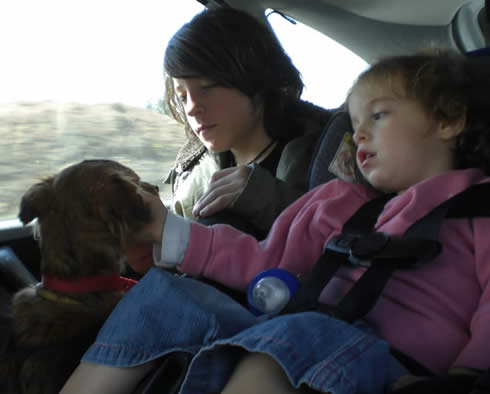
|
|
"Finetuning to
My Present" in the evening -22:21 - at Shoham!!!!
Little did I know, that the
flexibility of my "neck" would be tested
today,
and I must admit, that in the middle of the test I
failed ...
This time it was not a technical bug,
which seemed to waste my time and to prove me my dumbness
(Immanuel - and so many gifted
men before him - said:
"Look it is really
easy, why can't you....")
but an extraordinary mess in
my travel route to Shoham.
Since my childhood traveling has been immensely stressful
for Body.
be it by car, by bus or even by train, so there I
can at least stand up.
Therefore any additional hardship on a journey is
hard to accept.
Today the hardship exceeded my ability to turn the
frightful into the fruitful.
I arrived at Beersheva
bus station, passed over to the train station
and - - - - - - found all its glass doors closed.
No trains today.
[They double and improve a certain rail passage].

It was not the first time and
I could have learnt from past experience.
But the purpose of today's "travel bug"
was not to teach me this...
Even if a "bug" is the result of carelessness
and lack of attention,
my Higher Self, the
producer and director of my daily drama,
only utilizes the carelessness to introduce a "bug"
into the play.
If a "bug" is needed, some other circumstance
would have been found,
even if I had carefully inquired about the train's
schedule.
I went back to the bus-station, intending to take
the bus to Tel-Aviv,
and from there to take the train south again to the
airport train station,
where I usually arrive and from where Efrat was supposed
to fetch me.
But the crowds awaiting the bus from Beersheva to
Tel-Aviv were such,
that I turned away in dismay and caught a bus to Jerusalem,
asking the driver to let me off as close to Shoham
as possible.
It was a driver with a black kippa, he never heard
about Shoham...
"It's close to the airport!"
I needed to explain
and together we decided that I should get off at Nakhshon
junction.
And from there?
Another bus and more cars than I could could count
and miles of walking...
I even sat into a taxi for 3 minutes, until the driver
said,
he didn't feel like going to Shoham, and anyway it
would cost 100 NIS.
So I got out again, only to fall into the worst of
traps:
the driver, with whom I hitchhiked didn't know where
to let me off.
He didn't tell me, that the road from Modi'in would
became "Highway 1".
"So where is there a junction?"
I asked in despair.
"Only close to Tel-Aviv
or --- maybe here - there's a sign "to Lod"."
He let me out,
but there was no junction, there was just the highway,
and it was dark now.
No taxi came along, and hitchhiking was impossible,
even forbidden there.
I was lost, like
I was lost in the snow covered forests of the Pyrenees.
All my sense of orientation had vanished.
I walked and walked along the endlessly streaming
vehicles,
until a highway "to Petach-Tikva" split
off from the highway number 1.
I walked and walked and reached a T-junction, highway
number 40,
to the right: Petach-Tikva, to the left: to Lod.
I remembered that road 10, 20, 30, 40 years ago....
How can one cope with these racing highways everywhere.
Efrat called me again, she would ask a taxi-driver
at Shoham, she knew.
I waited and waited at that T-junction, cars turning
north or south.
and a ditch ran behind me, filled with muddy rain-water,
a rude choir of frogs added to the weirdness of the
situation..
"For what purpose did I stage this?" I asked
inside.
To my surprise the answer was right there:
"You must adapt to
this racing of your time-period.
It is not enough that you know your way around in
the desert,
and have no problem to hitchhike on familiar routes
.
You set this experience up in order
to train yourself!
Just like you agreed to repair your cellphone not
at Beersheva but at Modi'in,
so that you would need to take your children's car
and remember driving."
It was then, that Efrat's taxi-driver
called me.
"I'm too far away from
you, but you are on an excellent spot!
Turn north and you'll soon reach "El-Al Junction!"
Suddenly it was easy: I turned
into the road to Petach-Tikva,
I lifted my hand, and the 5th or 6th car stopped,
an old man.
When I told him my destination, he was annoyed :
"Wouldn't it have been
good for your health,
if you had walked that short distance?"
I defended myself: "If
you knew how much I walked before",
but we were already at El-Al
Junctin and he let me off.
At the bus station there a soldier told me,
that a bus from the airport to Shoham was due in 13
minutes.
But I didn't have to wait that long,
a car stopped to let a woman enter, I asked, if I
could come with them,
and they drove to Shoham and let me off 3 minutes
from my destination.
Efrat and Mika were at a Sound
and Movement activity and not home.
This permitted me some 20 minutes to "catch my
breath".
When they came, I I was in my room and did not meet
them half way
So Mika came around to my open door, calling: "Racheli,
Racheli",
and meeting me even wanted to be taken on my lap for
a second.
Most of the time she
doesn't want to be held by anybody.
It was as if she knew, that
I needed some consolation....
|
|
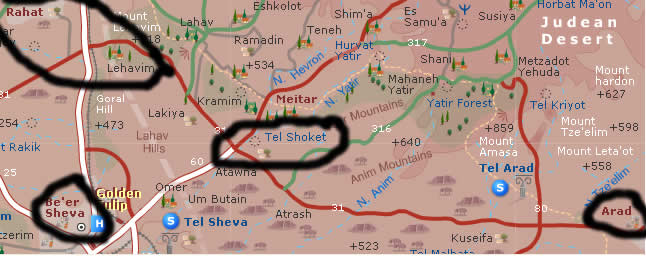
The bus-route from Arad via Shoket junction to Be'er
Sheva
and the road along the train track from Be'er Sheva to Lehavim/Rahat:
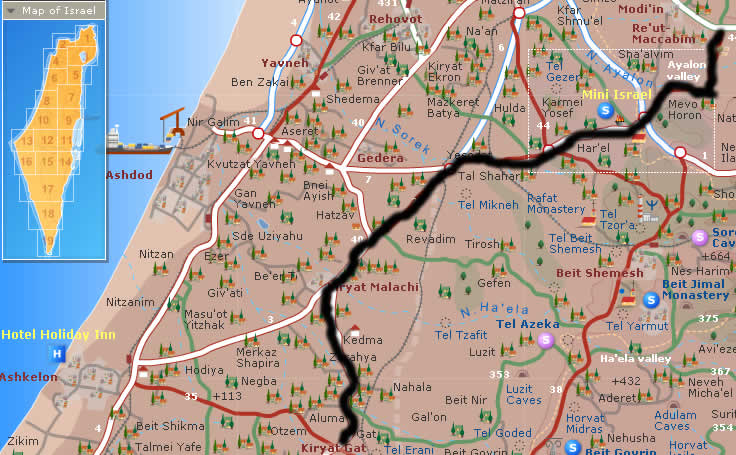
The road goes further north and passes by KiryatGat.
My bus to Jerusalem drove through all its neighborhoods, but did NOT
pass by the train-station...!!!
If it had, I could have taken the train from there.
The bus then returned to the road north, passes through the Kiryat
Malachi Junction, better known by its pre-Israel name (forgot)
goes on to Re'em Junction, better known by its pre-Israel name (forgot)
from where the bus turned to the east - through Tal Shahar and Yesodot
- and let me off at Nachshon Junction.
Since the only relevant map in English I 've discovered now, is this
"Touring
Map of Israel",
"Mini Israel" is high-lighted, while Kibbutz Nachshon, important
in Israel's history as well as in my own, is left out,
as well a "Neve-Shalom"
and the Latroun Junction next to the Latroun Trappist Monastery.
Why on earth "Sha'alavim" on the way to Modi'in was important
for the map-makers , I don't know.
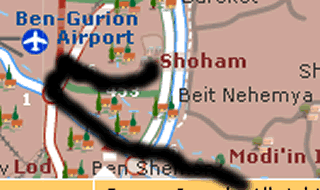
The last, most difficult passage through the
Lod-PetachTikva Junction, can not even be guessed from this section.
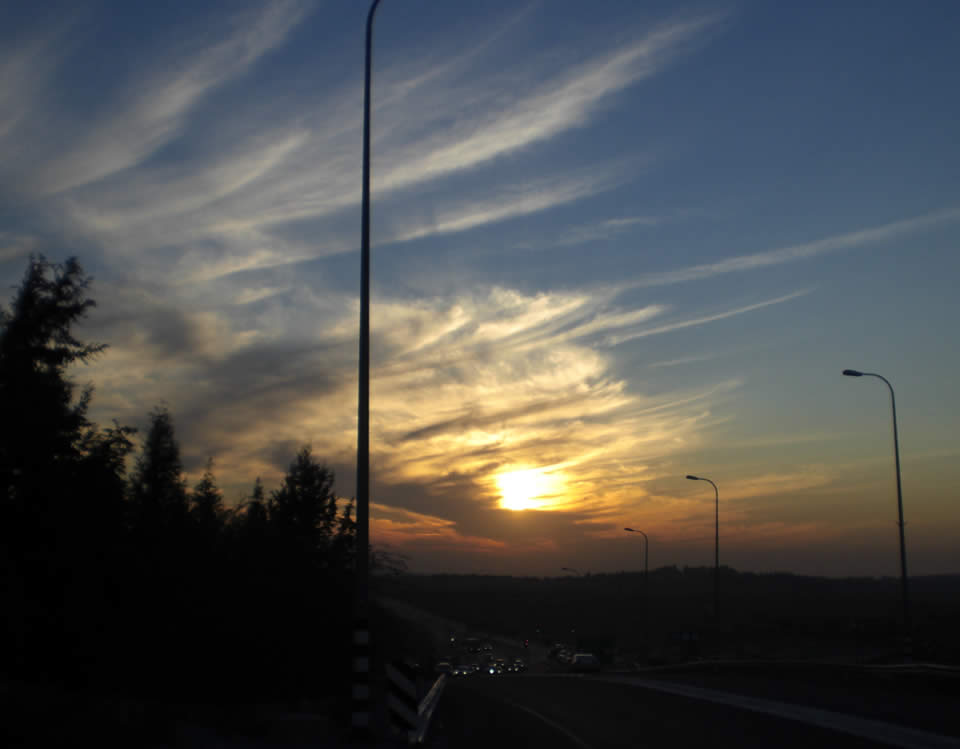
There were a few highlights after all:
Somebody, I don't remember if it was a bus or a car, let me off at
Latroun junction.
I walked up the road into the direction of my journey - as I always
do when hitchhiking -
and this is what I saw: when I turned back: a glorious sunset.
It was from this perspective - turning back - that I also got a glimpse
of the Latroun Trappist Monastery.
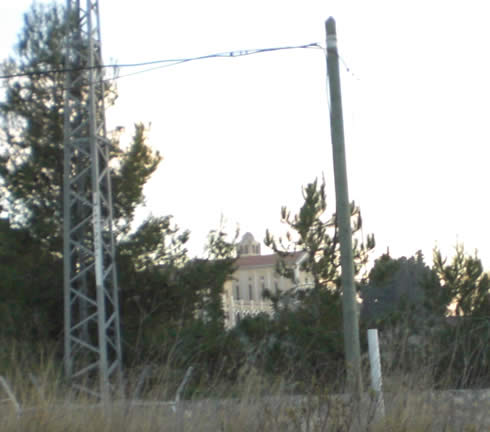
Finally a car stopped - a religious woman,
but after a few moments she turned into the highway to Jerusalem,
and I had to get off again.
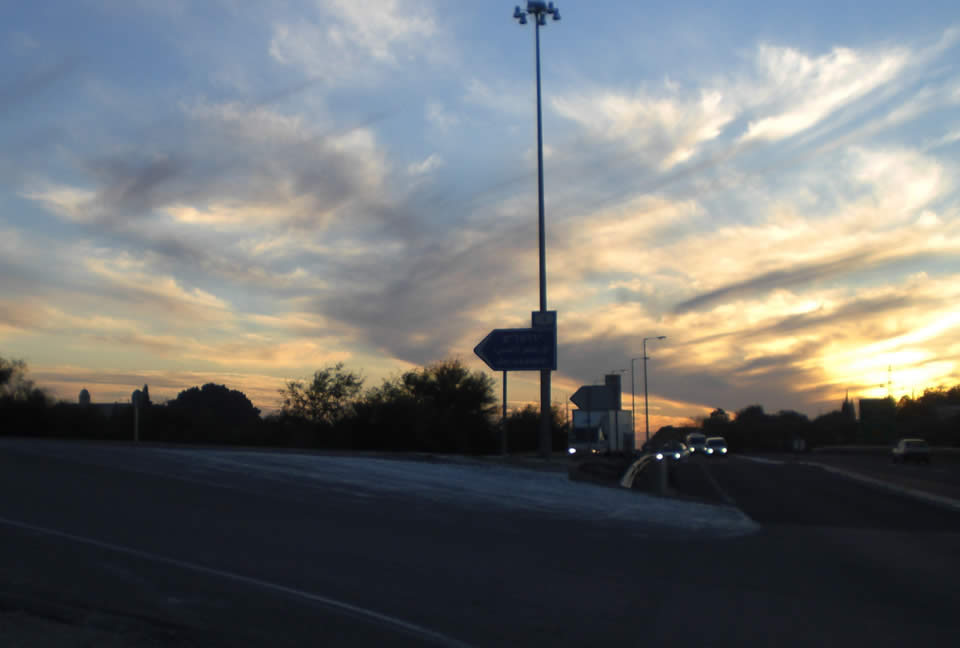
The next car was driven by a religious man and
his two kids who were reading the prayerbook.
He let me off at the junction to his big village "Sha'alavim".
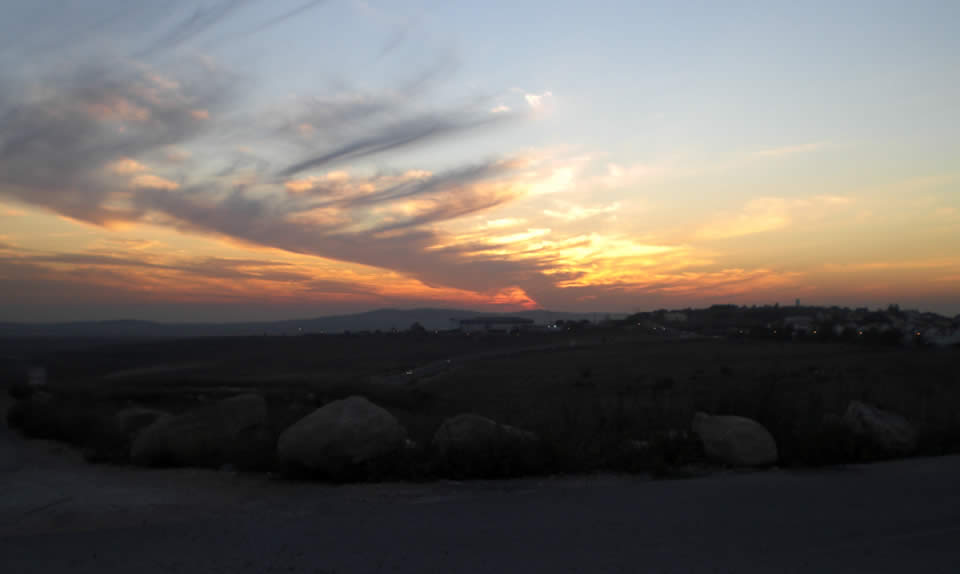
There is a personal story connected with Latrun
, as there is a personal story connected with Sha'alavim, but no time
to tell .
From the same junction - before running to the other
side to lift my hand again - I saw the following image:
A huge bridge under construction - for the train to Jerusalem - changing
the familiar view.
I had seen this view so often in the years 2001-2004,
when I lived at Modi'in and took my daughter's kids to the pool at
Neve-Shalom
or to the Canada Forest,
or when I hitchhiked to "Succah
in the Desert".during the "Desert Peacse Process",
for instance.
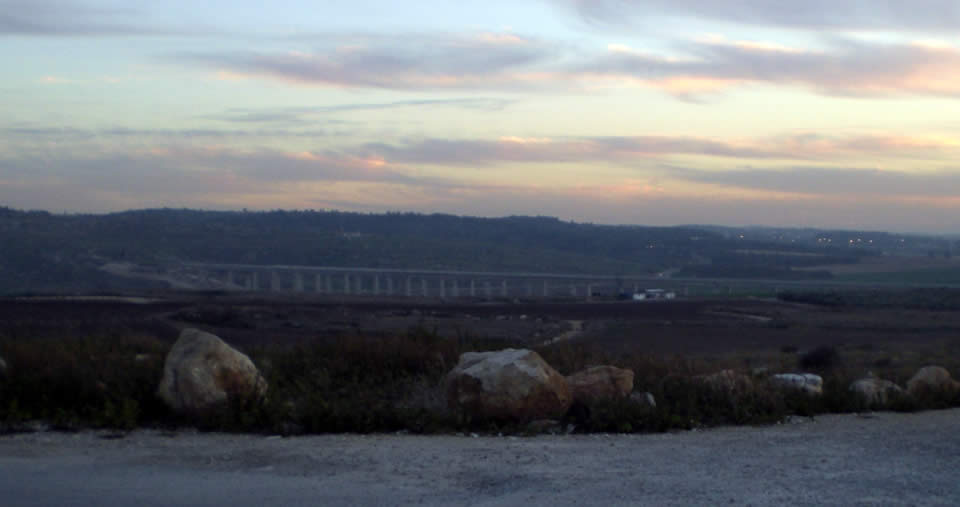
Nourishment from
Others
The
radical loser, 2005, Translation:
Nicholas Grindell.
Following the renewed experience with
Tomer,
and the self-victimisation of young people in Western countries
in general,
and "terrorists" in the Middle East in particular,
I want to study this article, which I discovered "by
chance":
"The article appeared in German
in Der Spiegel on November 7, 2005. "Hans Magnus Enzensberger
is one of modern Germany's most interesting and celebrated
writers. Among his books of poetry are "The Sinking of
the Titanic" and "Mausoleum". His prose works
include "Europe, Europe" and "Civil Wars".
Hans Magnus Enzensberger
looks at the kind of ideological trigger required to ignite
the radical loser - whether amok killer, murderer or terrorist
- and make him explode.
I. The isolated individual
It is difficult to talk
about the loser, and it is stupid not to. Stupid because there
can be no definitive winner and because each of us, from the
megalomaniac Bonaparte to the last beggar on the streets of
Calcutta, will meet the same fate. Difficult because to content
oneself with this metaphysical banality is to take an easy
way out, as it ignores the truly
explosive dimension of the problem, the political dimension.
Instead of actually looking
into the thousand faces of the loser, sociologists keep to
their statistics: median value, standard deviation, normal
distribution. It rarely occurs to them that
they themselves might be among the losers. Their
definitions are like scratching a wound: as Samuel Butler
says, the itching and the pain only get worse. One thing is
certain: the way humanity has
organized itself – "capitalism", "competition",
"empire", "globalization"
– not only does the number of losers increase every
day, but as in any large group, fragmentation soon sets in.
In a chaotic, unfathomable process, the
cohorts of the inferior, the defeated, the victims separate
out. The loser may accept his
fate and resign himself; the victim may demand satisfaction;
the defeated may begin preparing for the next round.
But the radical loser isolates himself,
becomes invisible, guards his delusion, saves his energy,
and waits for his hour to come.
.....At last, this radical loser
– he may be just fifteen and having a hard time with
his spots – at last, he is master over life and death.
.....
But anyone wishing to
understand the radical loser would be well advised to go a
little further back. Progress
has not put an end to human suffering, but it has changed
it in no small way. Over the past two centuries, the more
successful societies have fought for and established new rights,
new expectations and new demands. They have done away with
the notion of an inevitable fate. They
have put concepts like human dignity and human rights on the
agenda. The have democratized the struggle for recognition
and awakened expectations of
equality which they are unable to fulfil. And
at the same time, they have made sure that inequality is constantly
demonstrated to all of the planet's inhabitants round the
clock on every television channel. As a result, with every
stage of progress, people's
capacity for disappointment has increased Accordingly.
.... Since the desire
for recognition knows no limits, the pain threshold inevitably
sinks and the affronts become more and more unbearable. The
irritability of the loser increases with every improvement
that he notices in the lot of others. The yardstick is never
those who are worse off than himself. In his eyes, it is not
they who are constantly being insulted, humbled and humiliated,
but only ever him, the radical loser....
. The threatening powers
that are out to get him are not hard to locate. The usual
suspects are foreigners, secret services, Communists, Americans,
big corporations, politicians, unbelievers. And, almost always,
the Jews.
For a while, this kind
of delusion may bring the loser relief, but it will not be
able to actually pacify him. In the long term, it is hard
to assert oneself in the face of a hostile world, and
he can never entirely rid himself of the suspicion that there
might be a simpler explanation, namely that he is responsible,
that his humiliation is his own fault, that he does not merit
the esteem he craves, and that his own life is worthless.
Psychologists call this affliction
"identifying with the aggressor". But what is that
supposed to mean? It certainly has no meaning for the loser.
But if his own life is worthless,
why should he care about the lives of others?
"It's my fault."
– "The others are responsible." These two
claims are not mutually exclusive. On the contrary, they reinforce
each ther. The radical loser
is unable to think his way out of this vicious circle, and
it constitutes the source of his terrible power.
The only way out of the dilemma
is to fuse destruction and self-destruction, aggression and
auto-aggression. On the one hand, at the moment of his explosion,
the loser for once experiences a feeling of true power. His
act allows him to triumph over others by annihilating them.
And on the other, he does justice to the reverse of this feeling
of power, the suspicion that his own existence might be worthless,
by putting an end to it.
As an additional bonus, from the moment
he resorts to armed force,the outside world, which has never
wanted to know anything about him, takes notice of him. The
media make sure he is granted an enormous degree of publicity
– even if it is for just 24 hours. Television spreads
propaganda for his act, thus encouraging potential imitators.
For minors, as shown by events in the United States in particular,
the temptation this represents is hard to resist.
... humanity never seems
to have expected individual lives to be treated as the supreme
good. All early religions set
great store by human sacrifice. Later, martyrs were highly
valued.......during the Cold
War there were those who shouted "Better dead than red!"
. ....
II. The collective
But what happens when the radical
loser overcomes his isolation, when he becomes socialized,
finds a loser-home, from which he can expect not only understanding
but also recognition, a collective of people like himself
whowelcome him, who need him?
Then, the destructive energy
that lies within him is multiplied –... and he is rescued
from his powerlessness by a fatal sense of omnipotence......
The radical loser has not disappeared
either. He is still among us. ...
"Left" or "Right",
it makes no odds. Each of these armed rabbles calls itself
an army, ...acting as if they were the representatives of
"the masses". Being
convinced, as radical losers, of the worthlessness of their
own lives, they do not care about the lives of anyone else
either; any concern for survival is foreign to them.
...
... only one violent movement
has been capable of acting globally – Islamism....Although
this Umma is subject to much inner fragmentation and badly
affected by national and social conflicts, the ideology of
Islamism is an ideal means of mobilizing radical losers because
of the way it amalgamates religious, political and social
motives.
A further promise of success
lies in the movement's organizational model. Turning
its back on the strict centralism of earlier groupings, it
has replaced the omniscient and omnipotent central committee
with a flexible network: a highly original innovation that
is entirely of its time....
III. The spectacle
In one respect, however,
the Islamists are without doubt a twenty-first-century phenomenon:
where their understanding of the media is concerned, they
leave their predecessors far behind. Earlier disciples of
terror also relied on "propaganda through action",
but the kind of worldwide attention achieved today by a nebulous
grouping like Al Qaida was not granted to them.
Trained by television, computer technology, the Internet and
advertising, Islamist terror now gets higher viewer ratings
than any football World Cup. The
all-important massacres are staged in Hollywood-inspired style,
modelled on disaster films, splatter movies and science fiction
thrillers. This too is evidence of a dependency on the hated
West. In the media output of terrorism,
the Society of the Spectacle as
described by the Situationists comes into its own.
More momentous still,
however, is the strategic use of suicide attacks, an invincible
weapon that cannot be seen by
surveillance satellites and which can be deployed practically
anywhere. It is also extremely cheap. In addition to these
advantages, this form of terror also exerts an irresistible
attraction on the radical loser. It allows him to combine
destruction and self-destruction at
the same time as acting out both his megalomaniac fantasies
and his self-hate. Cowardice
is the last thing he can be accused of. The courage that is
his hallmark is the courage of despair. His triumph consists
in the fact that he can be neither fought nor punished, since
he takes care of that himself.
....The Arab world's sense
of pride is hurt not only by
military inferiority to the West. Far worse is the impact
of intellectual and material dependency. In
the last 400 years, not a single noteworthy invention was
made by the Arabs.... This
means that for any Arab who cares to think about it, the very
objects on which everyday life in the Maghreb and the Middle
East depends represent an unspoken
humiliation – every fridge, every telephone, every power
socket, every screwdriver, not to mention hi-tech products.
Even the parasitic oil states, frittering
away their future security, are obliged to import the technology
from abroad; without Western geologists, drilling experts
and civil engineers, fleets of tankers and refineries
they would not even be capable of exploiting their own resources.
In this light, even their wealth is a curse that constantly
reminds them of their dependency.
..., Islamist terrorism is also
unable to do without such borrowings. Its entire technical
arsenal, from explosives to satellite telephones, from aircraft
to television cameras, comes from the hated West.
That such an
all-encompassing dependency should be experienced as unbearable
makes perfect sense. Especially
among displaced migrants, regardless of their economic situation,
the confrontation with Western civilisation leads to a lasting
culture shock. The apparent superabundance of products, opinions,
economic and sexual options leads to a double
bind of attraction and revulsion, and the abiding memory of
the backwardness of one's own culture becomes intolerable.
The consequences for one's
own sense of self-esteem are
clear...This burning desire cannot be fulfilled. The destructive
energy of the radical losers is doubtless sufficient to kill
thousands, maybe hundreds of thousands of innocent civilians
and to cause lasting damage to the civilization on which they
have declared war. One indication of the
potential impact of a few dozen human bombs is
the level of day-to-day controls that has come to be the norm.....
The consequences for Arab societies,
on the other hand, are fatal. ....
The project of the radical loser,
as currently seen in Iraq and Afghanistan, consists of organizing
the suicide of an entire civilisation. But the likelihood
of their succeeding in an unlimited generalization of their
death cult is egligible. Their attacks represent a permanent
background risk, like ordinary everyday deaths by accident
on the streets, to which we have become accustomed.
In a global society that constantly
produces new losers, this is something we will have to live
with.
|
Despite the hardship of this day, I've
continued to study this article,
with hope to find something nourishing in it after all.
But the only valuable understanding
- self-hatred, low self-esteem -
is not new to me,
and what is truly sad,
that there is not even the attempt to suggest a solution,
but only the judgment,
that the "losers" are hurting first of all themselves
and that life will be more difficult for us, but we shall
survive.
Since 1974 I have based my work with people and peoples
on
my understanding concerning self-esteem.
I am - once again - disappointed by a "great" thinker.
I want to close this day of my life
with what is always consoling me,
my tree - "my Dommim-Tree" at
Mod'in as well as at Shoham,
across our veranda on the "Dommim-Hill",
now doomed to become a commercial center.
The photos were taken,
when I wanted to reconstruct the scenery of my
"Lesson with Nella, the dog".
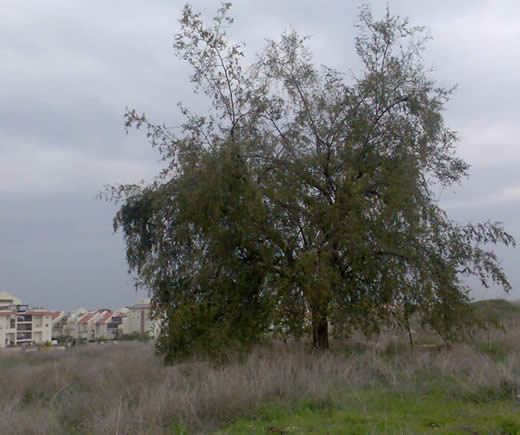
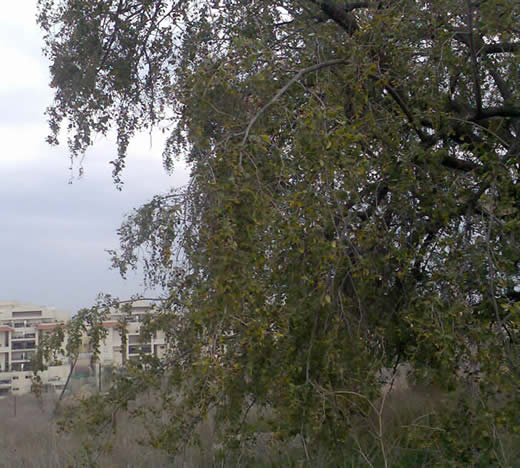
Our house is seen through the branches, leaves
and fruits
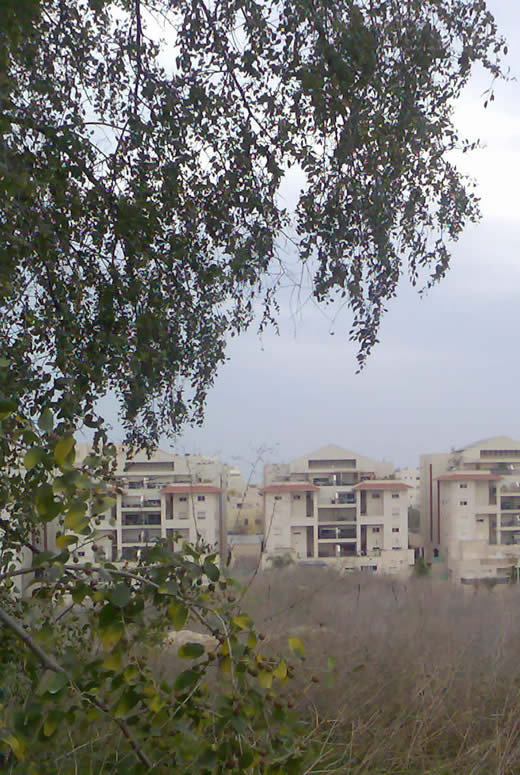
Again: Our house is seen through the branches,
leaves and fruits of my tree
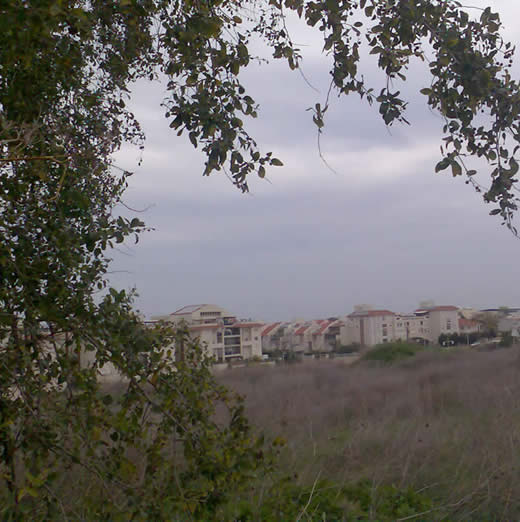
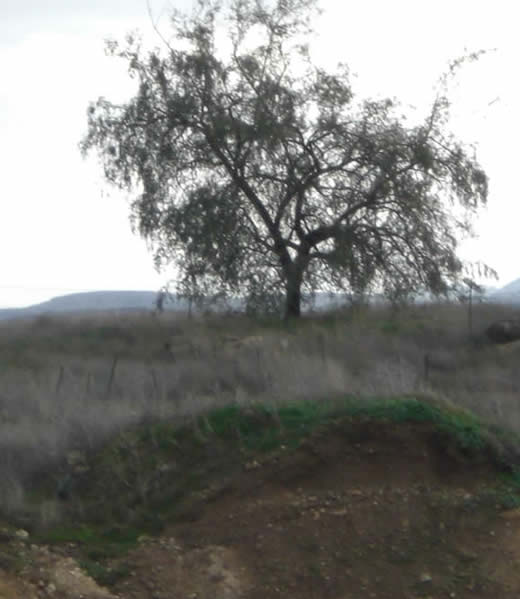
The tree - zoomed in - from our veranda
|
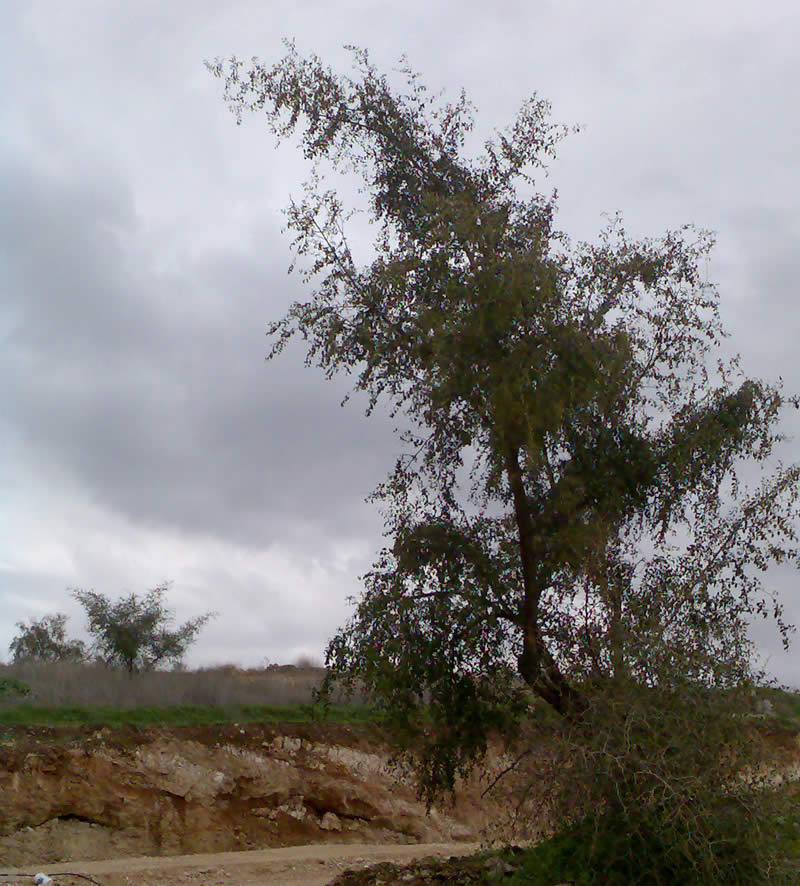
This young Dommim-Tree - from a certain perspective
seen in one line with a second young tree and the above old tree -
is a daily joy.
song
of the day
"I am" - NOT -
"a poor wayfaring stranger,
While traveling through this world of woe"
|
back to past ~~~~~
forward to future
home
~ library of seven years
~ intro to k.i.s.s.-log ~ contact


whole&full-filled,
never perfect&complete
Keep It
Simple Sweetheart
K.I.S.S.
- L O G 2
0 0 8
|

















